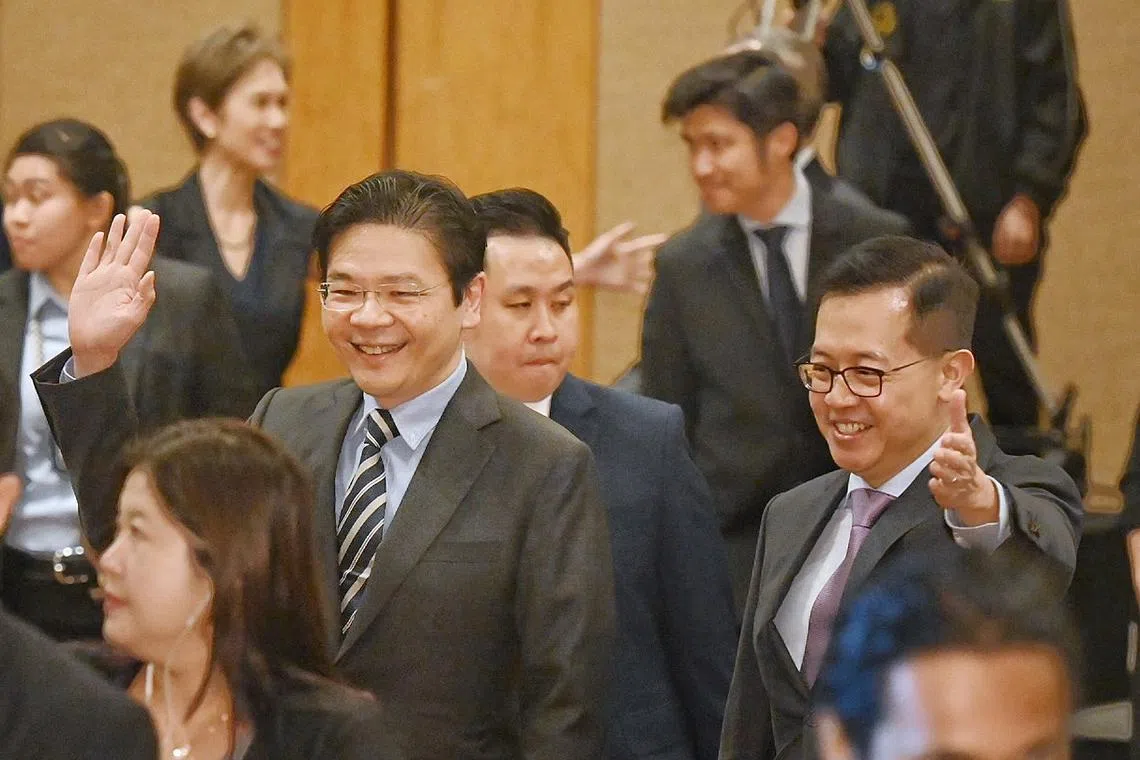Public service should be politically sensitive but not politicised: Lawrence Wong
Sign up now: Get ST's newsletters delivered to your inbox

DPM Lawrence Wong and civil service head Leo Yip at the annual Administrative Service dinner on Tuesday.
ST PHOTO: DESMOND WEE
Follow topic:
SINGAPORE - As a civil servant, Deputy Prime Minister and Finance Minister Lawrence Wong once sent an e-mail to a minister to express his disagreement with suggestions on policy changes related to Singapore’s economic transformation.
He was then serving as a member of the secretariat to the Economic Review Committee in 2001, and his forthright e-mail had shocked his colleague.
Recounting this anecdote on Tuesday night to an audience of top public servants, Mr Wong urged them to always be candid in sharing their views, reminding them that they had to be politically sensitive in order to do their work effectively, but should never become politicised.
“You must remain impartial and do your work with professional objectivity, while recognising the political context in which we operate,” he said at the annual Administrative Service dinner, which was held at Marina Bay Sands.
“So, as I have said before, please do not try to second-guess what you think I or your ministers will find politically convenient. Instead, give us your best professional judgment, and be candid in sharing your assessments and views because we value your contributions in this manner.”
The dinner was also an appointment and promotion ceremony of the Administrative Service. This year, 17 administrative officers were appointed and 83 were promoted.
Mr Wong said political leaders will have to deal with the politics – to win the confidence and trust of citizens, seek their support for policies and secure the mandate to govern.
This is why the Government will have to consider how far to go and how to persuade Singaporeans when tough calls have to be made, he added.
“Where the political leadership is concerned, including the 4G team and I, we are fully committed to doing what is right for Singapore and Singaporeans,” he said.
“To us, governing Singapore cannot be about scoring political points, or just doing what is politically convenient or expedient. We must always do what is right for Singapore and Singaporeans, that is our firm conviction.”
While the public service is not directly involved in the weighing of political considerations, public servants have to understand the priorities, considerations and agenda of the elected government, and also appreciate the growing diversity of Singapore society and the increasingly complex and contested environment it is operating in, he added.
Mr Wong, who was in the Administration Service before he joined politics, also urged public servants not to be disheartened when decisions made do not accord fully with their professional recommendations.
He stressed that while not all recommendations are taken up, it is always good for them to get a full airing so that decisions are taken based on the best collective judgment.
This had certainly been the experience fighting Covid-19 in the past three years,
Once a decision is made, everyone must close ranks and move forward as one, regardless of their initial perspectives on the matter, he said, adding that the continual striving for tomorrow to be better than today is something meaningful and worth pursuing.
“This is the working relationship I hope to have with the public service, especially our admin service officers, and senior public service leaders – one where we are always striving to do better and to scale new heights for our country and our people,” said Mr Wong. He has been named the leader of the fourth-generation group of political leaders, making him the presumptive next prime minister if the ruling People’s Action Party wins the next general election.
He also noted that to maintain a high-quality service, there has to be a steady pace of leadership renewal.
Over the past few years, several senior permanent secretaries have retired, he said. One-fifth of the senior public service leaders are also already in their mid- to late 50s, so there will be more retirements over the coming years. Meanwhile, 33 new senior public service leaders have been appointed over the past five years.
While it can be unsettling and difficult to see experienced officers who have proven their reliability and worth leave, Mr Wong said, leadership renewal is necessary for any organisation to remain healthy and sustainable.
That is why the service has to ensure that promising younger officers are able to progress in their careers and take on larger responsibilities over time, he said.
He urged the Administrative Service to expand the range of development and training opportunities for its officers, to better prepare them for future leadership roles.
He also called for administrative officers to pay attention to people management skills, and to embrace the wide diversity of talents across the entire public service.
“This is critical, for the ability to bring out the best in your people and team is a crucial success factor in any organisation,” he said.


